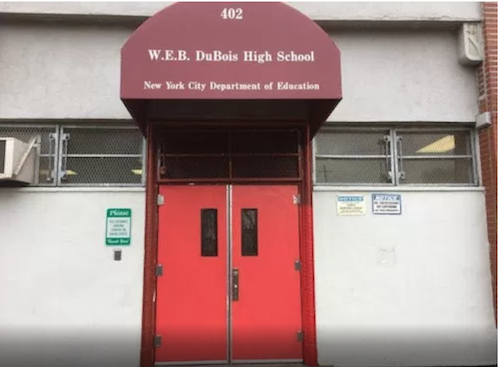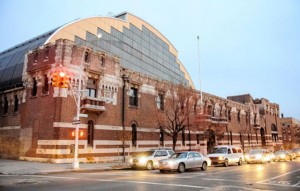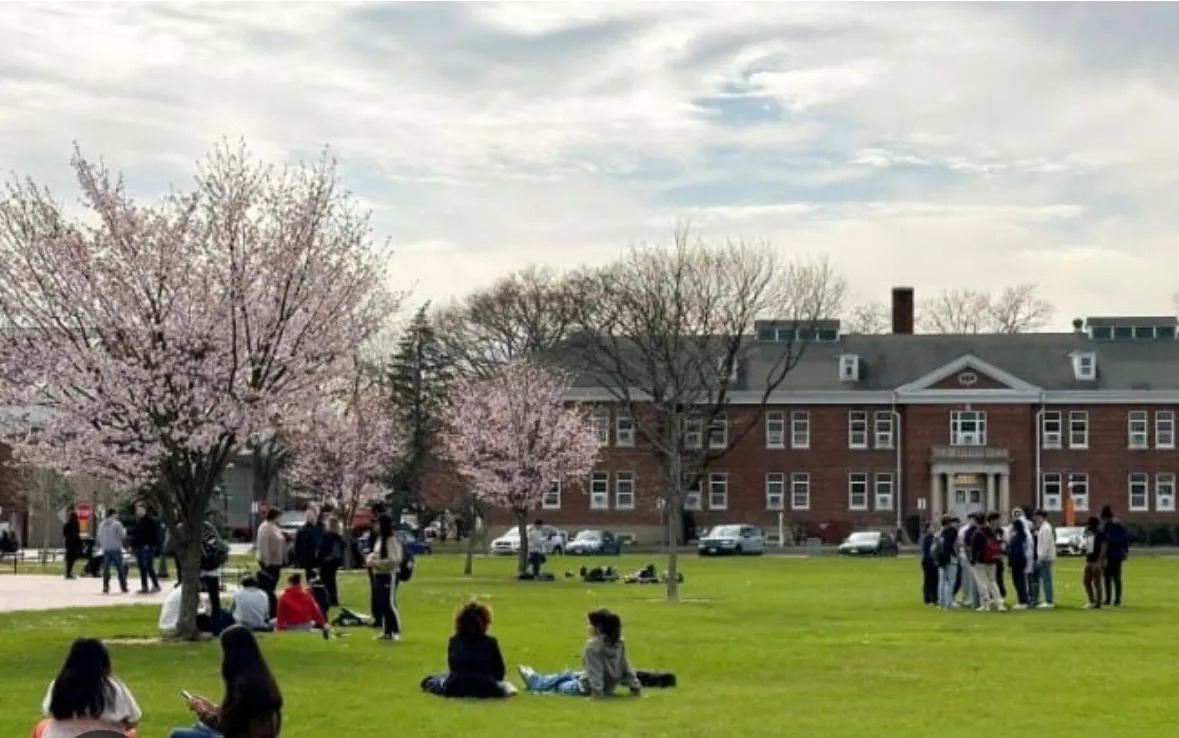Department Of Education officials last night denied they made a secret deal with big-money developers to close a historically black public high school in increasingly gentrified Crown Heights.
The DOE recently announced they are shuttering the school, named for seminal African-American Civil Rights activist W.E.B. DuBois, and transferring its students next year to the Brownsville Academy High School – in one of the city’s most impoverished neighborhoods.
Three major development projects are underway immediately across the street from the W.E.B. DuBois High School, on the corner of Eastern Parkway and Bedford Avenue. They include the multi-billion dollar Bedford Union Armory, a high-end hotel and a luxury housing development.
 “I want to be very clear. There were no conversations with developers about this building, there has never been any conversations with developers when this proposal was discussed,” said DOE Deputy Chancellor of Schools Elizabeth Rose at a public meeting in the school’s cafeteria.
“I want to be very clear. There were no conversations with developers about this building, there has never been any conversations with developers when this proposal was discussed,” said DOE Deputy Chancellor of Schools Elizabeth Rose at a public meeting in the school’s cafeteria.
The armory deal had the direct involvement of Mayor Bill de Blasio and his administration, which is also charged with running the DOE, and has faced a number of pay-to-play media reports dealing with developers.
Rose and Transfer Schools Superintendent Paul Rotondo arrived about 15 minutes late with no explanation for their tardiness to hear the concerns of more than 100 working-class parents, students, longtime civic leaders, clergy and elected officials regarding the closure.
The two DOE bureaucrats explained that the school, which also houses a middle school for at-risk older students and another school for suspended students, was being closed for low-enrollment and consolidated with the Brownsville school, where it will get additional programming opportunities.
The school currently has 134 students of which only 1 is of non-black or minority background, and includes among other amenities, a state-of-the-art recording studio.

Assemblyman Walter T. Mosley (D-Clinton Hill, Crown Heights) said enrollment has dropped specifically because the DOE starved it of compulsory funding.
“Instead of closing a school that serves as a beacon of hope for students that are in need of a second chance the department should be locating the five years of funding that W.E.B. DuBois High School has yet to receive,” said Mosley.
The Assemblyman went on to note that the school was expected to receive “compulsory funding through the Learning to Work Program” starting in 2012, but has yet to be allocated any additional funds through DOE. Additionally the school was upgraded from a “priority school” to a “focused school” two years ago entitling them to receive tailored resources that they are still lacking, said Mosley.
Additionally, the school is slated to receive part of a $1.7 million state Liberty Partnership grant through Medgar Evers College that the DOE will likely lose if the school is closed.
W.E.B. DuBois Principal Catherine Costa noted that the school lacks a gymnasium, a facility she was hoping to gain by the newly passed Bedford Union Armory deal. The Armory sits less than 50 feet away from the school and will feature a 138,000-foot recreational center that will include basketball courts and a swimming pool.

As part of the final armory rezoning the City Council passed last month, the mixed-use space will be required to be accessible to all members of the Crown Heights community. According to the plan, at least 50% of memberships for the recreational center will be reserved for community members at discounted rates of just $10 a month for adults and $8 for a child under 16.
“They [students] are definitely feeling the effects of gentrification. They feel as black and brown children they are being pushed out of this rapidly developing neighborhood and being denied access to great things in this community. I have been here as principal for 15 years going on 16 years and there is no gym in this building. There is not adequate space for physical education classes so I was excited when I heard about the Armory’s rec center,” said Costa.
Parents and civic leaders at the meeting were quick to point out that the increased development in the area, like the Armory, has resulted in the DOE’s consolidation proposal.
Richard Hurley, President of the Crown Heights Community Council, demanded an answer from the educational policymakers, hinting that the community believes that major real estate development is behind the move.
“There is no doubt about it that there is a need for this school in Crown Heights. When you talk about enrollment as the reason behind the proposal, that’s totally unacceptable. There is so much need, I can look out my window and start enrolling people in this school. We smell a rat, and that rat smells like a developer,” said Hurley.
The proposal is set to go before parents and community leaders in Brownsville within the coming weeks before the Panel of Educational Policy (PEP) takes a final vote on Jan. 24 at P.S. 20 The Anna Silver School, 166 Essex Street in Lower Manhattan.
Editor’s Note: A earlier version of this story stated the officials arrived over an hour late, but they only arrived about 15 minutes late.









